We are one of the few families who considered to be Still COVIDing, meaning we still isolate overall and wear high quality masks if we do have to venture out, even after seemingly everyone else has moved on. We have our reasons for this, including that I’m high risk for complications, death, and debilitating Long COVID. The more research that is conducted, the more validation we have we’re doing the right thing.
Do I need to explain myself and our decisions regarding continuing COVID precautions? No, not at all, but I’d like to educate others as to why we are doing so if they’re interested in learning more about us.
Note: As an Amazon Affiliate I earn from qualifying purchases made through affiliate links, at no extra cost to you. Read my full disclosure for more information.
Disclaimer: The information provided on this blog is for general educational purposes only and is not intended as a substitute for professional medical advice, diagnosis, or treatment. Always seek the advice of your physician or other qualified healthcare provider with any questions you may have regarding a medical condition.
Table of Contents
What Is Still COVIDing?
People who are considered to be Still COVIDing are those who continue to keep their distance from others, work from home, homeschool their children or enroll them in an online school, have groceries delivered or do drive-up orders instead of going into the store, avoiding crowds, and not going into buildings unless absolutely medically necessary. If we do go into buildings or gather in general, we wear high quality KN95 or N95 masks.
There are variations of Still COVIDing which depending on the group, such as on Facebook, that you’re in, something as simple as not working from home but masking at work can make you ineligible for certain Hard Core Still COVIDing groups. In other Still COVIDing groups, plenty of people are back to work in person, while masking, and have their kids back in school in person, while masking, but still are more careful than most.
Though we feel quite alone within our household as seemingly everyone we know has ‘gone back to normal’ there are thousands of people who still are considered to be Still COVIDing in one way or another.
Underlying Conditions I Didn’t Cause
At first I was afraid of dying from COVID-19, like a lot of people were. We all banded together, from our respected homes at least. As time went on, COVID fatigue set in and the majority of people stopped isolating, masking, distancing, and caring at all.
There are still those of us though that have underlying conditions that put us at more risk. We didn’t ask for these conditions, most conditions weren’t brought on by lifestyle choices or things we can control, they are hereditary or otherwise.
Yet, we are left behind as the rest of the country and world moves on with their lives.
Autoimmune Disease + Asthma = Higher Risk
I’ve had asthma and the autoimmune disease Hashimoto’s Thyroiditis since I was 12 years old (more info on that here). With Hashimoto’s my body mistakenly attacks healthy cells in my thyroid, chipping away at them little by little. I likely had Hashimoto’s before I was 12 and diagnosed with Hypothyroidism which means my thyroid had already been destroyed enough that it started needing synthetic medication everyday in order for me to function.
Once my body destroys my thyroid, it’ll go for other areas in my body such as my pancreas -causing diabetes, my joints – causing Rheumatoid Arthritis, and any of the 100+ various autoimmune diseases. There is no cure for them, just things one can do to try and lessen the severity of symptoms. And quite frankly, they don’t do a great job.
The thyroid gland isn’t something that is talked about widely but it is a vital hormone gland. It is part of endocrine system and controls many of the body’s important functions for producing and using hormones. When my thyroid levels are ‘off’ I can tell as everything in everyday life gets more difficult, painful, and I’m truly not myself.
All that said, I didn’t do anything to cause my autoimmune disease or my asthma. I was a healthy child, was thin, ate my vegetables, got exercise, all the good things I was supposed to do.
I point this out not to make myself sound good but to make others realize that those of us with underlying conditions typically didn’t cause them. It’s not like we did something wrong to deserve this life sentence. That’s what makes all of this even crappier.
It seems like so many have moved on with their lives in part because they figure that those of us with underlying conditions caused these conditions that make us more susceptible to severe disease, death, and debilitating Long COVID. However, that isn’t the case.
Sure, there are some underlying conditions that are caused by smoking, not eating right, etc. but for the most part, it’s due to things beyond our control.
COVID and Autoimmune Disease
“While multiple factors like older age, heart and lung disease, diabetes and obesity can put people at higher risk for more severe COVID-19, people with autoimmune disease are also at greater risk of having more severe COVID-19.”
Dr. Kevin Deane in an interview for UCHealth Today
The longer COVID-19 has been around, the more research has been able to be conducted. Obviously, it takes time to conduct research and a virus has to be around long enough to have any type of longitudinal data. Three years in and we know a lot more than we did even a year ago but we have no clue what this will mean 10, 20, 30+ years from now in terms of the health of the general population who has had COVID-19.
What they do know already is that underlying conditions, including autoimmune diseases like I have, often lead to worse outcomes and the higher prevalence of Long COVID.
The symptoms of Long COVID sound VERY similar to the symptoms I struggled with back in 2014 before I drastically changed my way of life, more than most people ever would, to try and feel decent again. I don’t feel 100% like a person without an autoimmune disease would feel, but I feel better than I used to with the huge changes I’ve made.
Again, not that I was doing anything ‘wrong’ but the processed foods, gluten, dairy, soy, environmental toxins from personal care and cleaning products, etc. wreak havoc on our bodies, whether we know it or not.
In 2014 my body went into a full force attack against itself and I have worked for years and spent thousands to feel better. Had I not done so much work, spent so much time, money, and energy in getting back to some semblance of normal, I wouldn’t have 3 children and I might not even be alive anymore. It wasn’t anything that I had done that caused the autoimmune flare, rather it was likely because I was actually having a lot of good changes in my life but even good change led to my body launching a full force attack throwing my life into a tailspin.
I knew that if I were to get COVID I’d likely end up back at square one and have to do all the hard work I’ve done in the past several years all over again. I’ve already had to do a lot of the work over, and over after having children, to try and get my body back to a decent place but with COVID it likely will be thrown off even more and possibly forever.
The symptoms I read of people who have long COVID sound so much like what I experienced with my autoimmune disease before I started my own research and my own interventions when doctors told me there was nothing they could do.
I can’t go back to that place. Especially as another life sentence of pain, dysregulation, restriction, and fatigue on top of this one I already have, which I’ll go more into in another blog post.
More recent research has indicated that women, in particular, who have a history of allergies, anxiety, depression, arthritis, asthma, being slightly overweight, and autoimmune disease appear to be more likely to develop long COVID than others. While I don’t have arthritis yet, I have the rest of the risk factors.
“It’s important for people with autoimmune disease to understand that the best approach to not getting severe COVID is to not get COVID in the first place.”
Dr. Duane Pearson, rheumatologist with the UCHealth Rheumatology Clinic and Professor of Medicine
Conditions Far Worse Than Autoimmune Diseases
I just wanted to take a minute to take a step to the side. My experience with my autoimmune disease is NOTHING compared to what so many others experience with other chronic health conditions such as kidney disease, liver disease, lung disease, having an organ transplant, diabetes, heart conditions, HIV, disabilities, immunocompromised or those with a weakened immune system, and many more.
They are at a higher risk of developing severe symptoms from COVID or death. They are also being left behind, those of them who like me are still taking COVID seriously.
There are also other autoimmune diseases that are more severe than Hashimoto’s such as Lupus, Crohn’s disease, and many others. I’m by far not saying that what I have is anywhere near as severe, just writing this from my personal point of view as someone with Hashimoto’s.
This Isn’t All About Me, It’s About My Children
Though the initial reason we isolated more strictly and longer than others was due to my conditions, it’s not just because of me. It’s because of my children.
Though I used to be a school psychologist, I am a stay at home mom now and I homeschool my 3 little boys. My twins aren’t old enough to be in all day school and won’t be for another year and a half so if something did happen to me, my husband would be in quite the pickle trying to figure out care for them, even if our oldest was going to in-person school.
Beyond that, I don’t want my children to be without a mom. I don’t want them to have to see me suffer and worry about me. I don’t want them to have to go to in-person school where I don’t feel they’ll get the support they need and quite honestly I don’t feel they’ll be safe with the rise in prevalence of school shootings. I don’t want my husband to have to lose his wife and figure out how to do all that I do for the family on his own. He’s got enough to do with working full time and being an amazing dad to our children.
I don’t want our kids to end up with Long COVID which may last them their whole lives. Sure, they might not end up with it but two of our kids have had heart issues in the past and had RSV as infants, one of which needed to be in the hospital for a week because of it. Our twins were premature and one was in the NICU for a week, partially due to breathing difficulties. Do I know that any of those particular conditions will lead to severe or Long COVID? No, I do not. However, I’d rather not take my chances since we don’t have to.
Since autoimmune diseases run deep in our family tree, our kids are more likely to develop an autoimmune disease in general, which hopefully won’t happen or at least not for a long time. There are three things that come into play with an autoimmune disease: genetic predisposition, environmental triggers (infections, food sensitivities, etc), and intestinal permeability (a.k.a. leaky gut which is a lot more common than you’d think). I am quite certain I can pinpoint when all 3 collided within my life and I developed Hashimoto’s long before I was diagnosed. I’ve lived with it basically my whole life with things becoming worse as I get older and I really don’t want my kids to get it as early as I did, or even earlier.
Increasingly more research is showing that the prevalence of autoimmune diseases developing after a COVID infection within seemingly healthy people is on the rise.
Long COVID Research
As we move further away from the initial onset of COVID-19, scientists are learning a lot more about COVID and it’s long term effects. It isn’t ‘just a cold’ or like influenza which will go away in due time and typically not have long lasting effects. Even if you get COVID and feel like you’re all better, your body might still be under attack without you knowing it or you may be very aware of it, either way it’s commonly referred to as Long COVID.
Scientific American published an article recently regarding Long COVID and how it now looks like a neurological disease that affects much more of the body than scientists and doctors had previously known. As an aside, Scientific American’s articles are solidly based on scholarly research, so I trust them more than the typical publication.
The article mentions a woman who contracted COVID-19 in 2020 and continues to suffer from symptoms even 3 years later. Her background, an autoimmune disease and asthma, is strikingly similar to mine. She’s also always been an overachiever, just like me, and she’s in her late 30s, as I am. Her continued symptoms include memory loss, extreme exhaustion, tremors, dramatic mood swings, trouble thinking and speaking, and a painful hypersensitivity to sound.
“A meta-analysis of 41 studies conducted in 2021 concluded that worldwide, 43 percent of people infected with SARS-CoV-2 may develop long COVID, with about 30 percent—translating to approximately 30 million people—affected in the U.S.”
Scientific American Article Long COVID Now Looks Like a Neurological Disease, 2023
Studies have shown that in some people who are infected with COVID-19 continue to have an inflammatory response within their bodies, especially their brain, long after the virus has passed. This leaves one to wonder why the immune system continues to attack after the virus is cleared.
According to Torgerson, “one option is that you’ve developed autoimmunity,” in which antibodies produced by the immune system to fight the virus also mark a person’s own cells for immune attack. The response to the virus “turns the autoimmunity on, and that doesn’t get better even when the virus goes away,” he says. Several studies have found evidence of autoimmune components called autoantibodies that interact with nerve cells in people with long COVID.
Dr. Troy Torgerson, an immunologist at the Allen Institute in Seattle as quoted in Scientific American
It isn’t just people who have underlying conditions who develop Long COVID but we are likely at a higher risk. Reading this article, among many others on the topic, further solidifies our decision to continue to protect ourselves from COVID-19.
COVID-19 has been found to harm the brain and nerves years after the infection has cleared. It can also lead to a heart condition called postural orthostatic tachycardia syndrome (POTS) which makes one’s heart start racing to the point it’s difficult to think, breathe, and leads to other symptoms throughout the body.
While Still COVIDing, We’re Quite Content
Overall, we’re quite content in our little bubble. We love having my husband work from home out of the office in the lower level of our house. We love having our children home with us 24/7 (usually love it – lol) and love being able to teach them. I love seeing their little faces light up as they’re learning to read and perform math equations. They’re all well above grade level which is pretty awesome. We don’t push them to be that way, they just love learning and we love encouraging them to learn.
Not going into stores has been an adjustment, for sure. I’m the type of person who used to LOVE hanging out at a mall as much as I could. I used to go to a mall pretty much every weekend when I was growing up and went even more often once I got my driver’s license. I had 3 malls within 30 minutes of me plus the Mall of America! It’s not that I was always buying things, even just spending time walking around the malls was fun. Beyond that, even just going into Target to get what we needed instead of shopping online is something that I miss somewhat, though at least I don’t end up with as much random stuff that I don’t really need!!
The main thing that we miss and that we would change if we felt safer doing so would be seeing family and friends in person, indoors, and hugging them. We miss that a lot. We still see some family outdoors, from a distance, but not in large groups and not often. We are grateful that we are able to see some of them within the parameters in which we feel relatively safe and that we can do video calls with them as well.
Unfortunately, a decent portion of my extended family feel we are too over the top with our continued precautions and that we are in the wrong for doing so. Many have been quite vocal about this. At this point, it is what it is and I can’t let myself sit and be upset that I’ve lost much of the family I grew up with and used to be so close to. I try to move forward and continue to protect the family within our home.
I look at it this way, if I were to get sick, be unable to care for my kids, or die, it’s not like anyone else would show up to take my place. I need to do what’s best for us within this home, not whatever someone else thinks.
All in all though, we’re very happy and healthy. The kids are learning so much, I’ve been able to start my own business which with a lot of hard work has grown exponentially over the past year, and my husband has a better work-life balance since he no longer has to commute. Without the hustle and bustle of going places all the time, we can relax more and enjoy hobbies such as painting, crafts with the kids, woodworking, reading, crafting with my Cricut, building miniature dollhouses, and gardening.
We Realize We’re Privileged
With all of this said, we surely recognize that we are very privileged to be able to work from home, homeschool, do online school through a local school district, and run a small business from home. We realize that most people aren’t able to work from home or homeschool, whereas others simply don’t want to. I’m surely not saying that everyone should do what we’re doing, quite the opposite, I’m explaining why we do what we’re doing. Especially since we are going against the ‘norm’ to protect our family the best way that we know how.
We aren’t alone, there are many people out there across the country and world who have chronic health conditions who are still concerned about COVID. Not everyone has the luxury of being able to stay home like us. The New York Times recently had an article that they also made into a podcast episode on The Daily all about a school that is still feeling the effects of covid and how many kids have lost multiple family members to COVID, as well as teachers who are high risk and trying to protect themselves against it.
– The Daily Podcast – “The School Where The Pandemic Never Ended”
The End of Federal & Worldwide Emergencies
As of early May 2023, the World Health Organization (WHO) and the U.S. Federal Government have ended their health emergency provisions. However, this does NOT mean that the COVID-19 pandemic is over. It means that COVID-19 is no longer ‘new’, it’s not something that can be contained, and isn’t something that is an emergency, rather, an ongoing threat.
We all knew this would happen at some point and it’s not surprising since so many people have ‘moved on’ despite the continued health risk and new variants, but it is concerning. This means many things, of which I am honestly not well versed, but I have read information from Dr. Katelyn Jetelina of Your Local Epidemiologist who had an outline in her most recent newsletter regarding what these changes mean in great detail, which I’ll link below. She details how this doesn’t mean that the pandemic is over, it doesn’t mean that COVID-19 is gone, and it doesn’t mean that we can go back to the way it was before the pandemic, even though so many have.
Ending the Federal emergency also doesn’t mean that the pandemic is over, it just means the money that goes toward it won’t be available anymore. This means antigen tests won’t be available for free anymore, vaccines will be available but not as accessible, Paxlovid will eventually run out and could be quite expensive to obtain, healthcare coverage for those with Medicaid may change, and the national surveillance will greatly decrease.
Granted, the surveillance hasn’t been all that accurate, especially recently since rarely anyone seems to test anymore, and if they do at home typically those aren’t recorded anywhere. However, this will make it so that test positivity rates will likely go away, hospitalization data will still exist but we aren’t sure how often it’ll be updated. All of this decreased surveillance will mean that we will have a harder time knowing if there is an uptick of cases, especially if a new variant comes along, something that may change the behavior of some who are concerned about catching COVID-19 if there is a rise in cases yet not overall in the situation we’re in currently.
What that tells me is to continue masking, social distancing, not going into crowded places such as stores unless necessary, etc. That’s just me though (and my husband and kids).
Below are the easy to read and understand explanations of what the end of these programs means in detail.
Our Future Plans
I initially wrote this post before the federal and international emergencies were over and I was actually starting to let my guard down some…however, with the surveillance decreasing drastically and a new variant of omicron coming into view, I’m rethinking that decision. It’s been noted that with the newest variation, built up immunity from either contracting COVID recently or being vaccinated against it, don’t stand up to the sneakiness of the omicron subvariant XBB.1.16 known as “Arcturus” which is a cause for concern.
There are still almost 90,000 cases in the U.S. every week, which is likely a huge undercount. The test positivity rate is decreasing but still above 5 which is the marker for uncontrolled, and again this is likely an undercount. There are still over 1,000 people dying of COVID every week in the US. This article from Nebraska Medicine details the latest variants, where certain ones are dominating, and what this means overall.
Time Magazine published an article about how COVID-Cautious Americans feel abandoned, which finally helped me feel seen because that’s how we feel. Like we’re left behind while everyone else has moved on.
Do we plan on being isolated forever? No. We’re all vaccinated and we hope to venture out a bit more in the coming months, while still masked and distanced. I don’t see us changing anything drastically though in the near future. Again, the main thing we’re missing is being close with family.
Do we plan on always homeschooling/doing online school? Yeah, I think so. I love being able to give 1:1 or 1:3 guidance to our kids and playing an active part in their education. With online school I know they’re meeting the grade level standards and they get video calls with their class everyday but I also get to be there to teach them, encourage them to explore their interests, and work together as a family. There also isn’t homework, bullying, rushing around in the morning, stress of controlling for food allergies, etc. We can be more relaxed in our learning environment.
How do we plan on ‘socializing them?’ We do have some wonderful friends who live just a few miles away who are also Still COVIDing that we get to hang out with and socialize with. We also have our oldest enrolled in an online weekly Lego Club, Karate Class, Social Skills Club, and Tech Club. All 3 boys are in Quest Scouts which is with other Still COVIDing families who meet once a month in-person wearing high quality masks to complete what is required to earn badges for scouts and we complete another badge at home each month. We’re also adding more playdates with covid-cautious families to our calendar and our oldest is having more video calls with his classmates outside of the school day.
Will we ever go ‘back to normal’? Who knows at this point. I’d love to say yes. I’d love to just drop all restrictions we have and move forward like the rest of the world but we don’t feel that’s the right thing to do at this time.
Again, I want to reiterate that we don’t think we’re above anyone else. We don’t think anyone else is doing anything wrong by not Still COVIDing. Everyone has to make decisions for themselves and their families, which is what we’re doing for ours.
When it comes down to it, I don’t judge anyone’s decisions and I wish others wouldn’t judge mine.
Resources/References
- Information Regarding Long COVID
- Scientific American article about Long COVID
- RECOVER: What is Long COVID?
- New York Times Article about Still COVIDing
- Cleveland Clinic – Autoimmune Diseases
- What’s Really Going On In Hashimoto’s? by Izabella Wentz, PharmD, FASCP
- Autoimmune Disease and COVID-19
- Risk of Autoimmune Diseases in Patients with COVID-19
- Is Post-COVID Syndrome an Autoimmune Disease?
Our Favorite Masks
There are a lot of mask options out there but here are our favorites from reputable sources!
These kid masks are adjustable, KN95, and come in various colors. They are around $1 each and have free shipping. These our our favorite masks for our kids and their favorites as well as they didn’t like the duck bill ones we had previously. These are comfortable and seal well. They are individually packaged which is great for being on the go!
For adult masks, we prefer the 3M Aura Particulate Respirator 9205+ N95. They are comfortable, fit well, and work well!
We use our masks several times before disposing of them since we just tend to use them once every week or so when we’re possibly around other people such as at a park or small family gathering.
My Other COVID-19 Related Posts
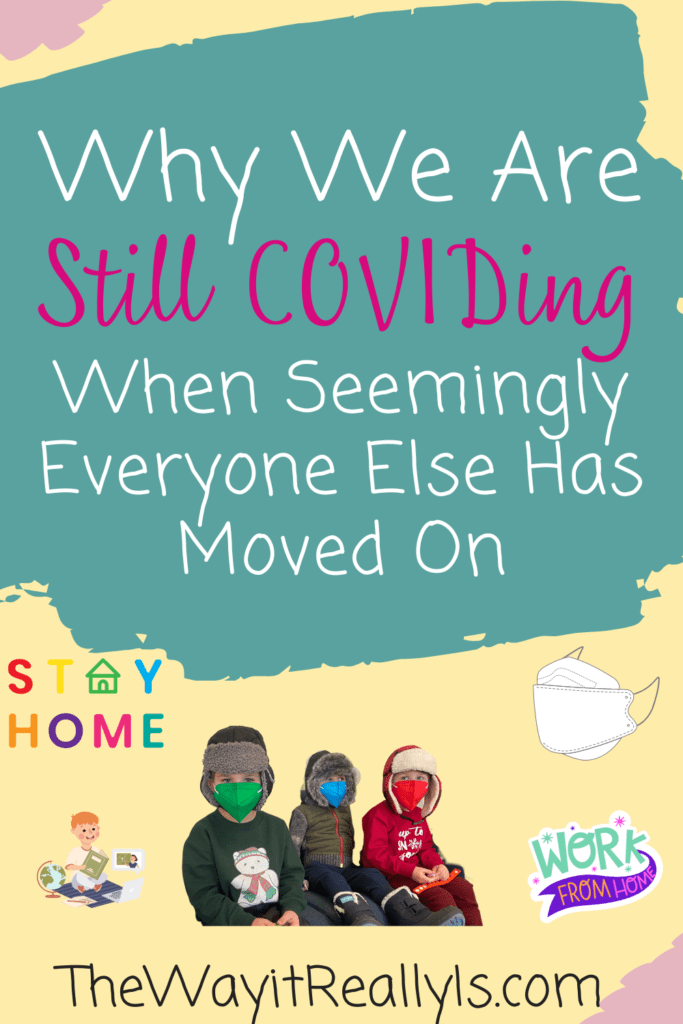
As a mom of identical twins and a son two years older, I have gained invaluable experience in the realm, and chaos, of parenting. With a Master's Degree and Education Specialist Degree in School Psychology, I spent years as a school psychologist, helping children navigate through their educational and emotional challenges. Now as a stay at home mom and professional blogger, I combine my areas of expertise to help you in your parenting journey.

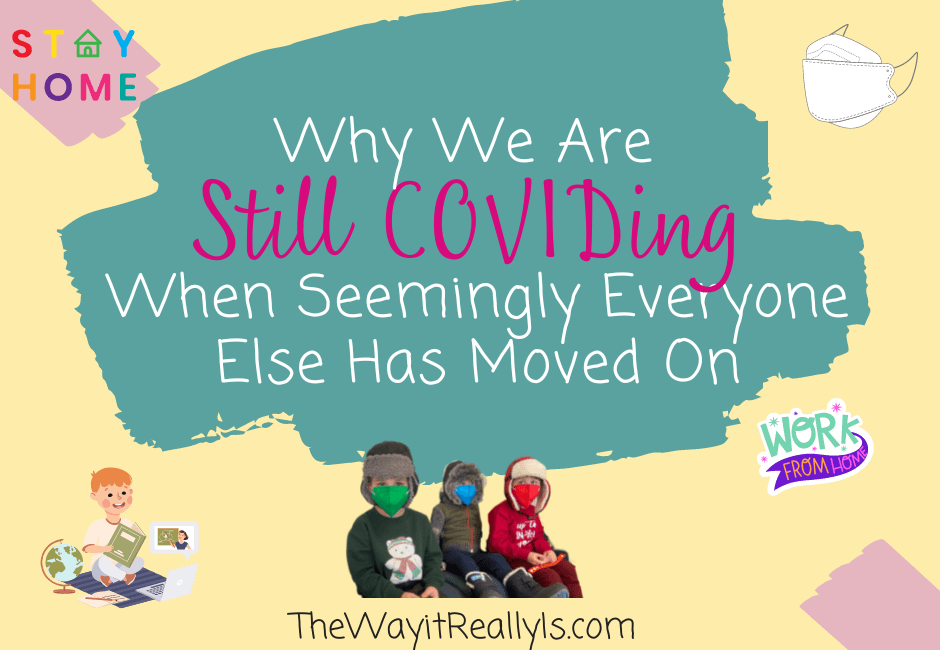


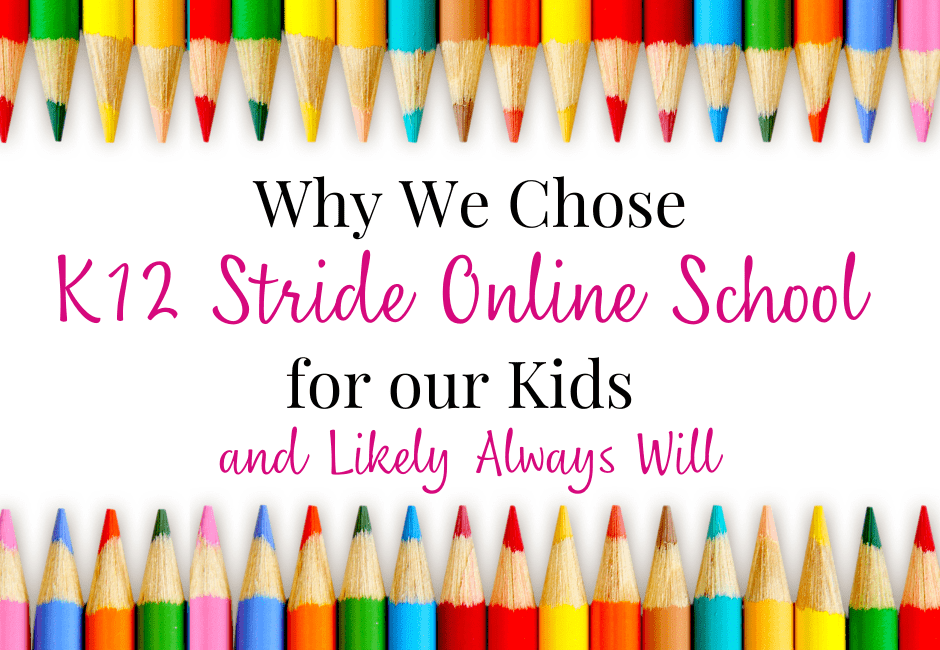

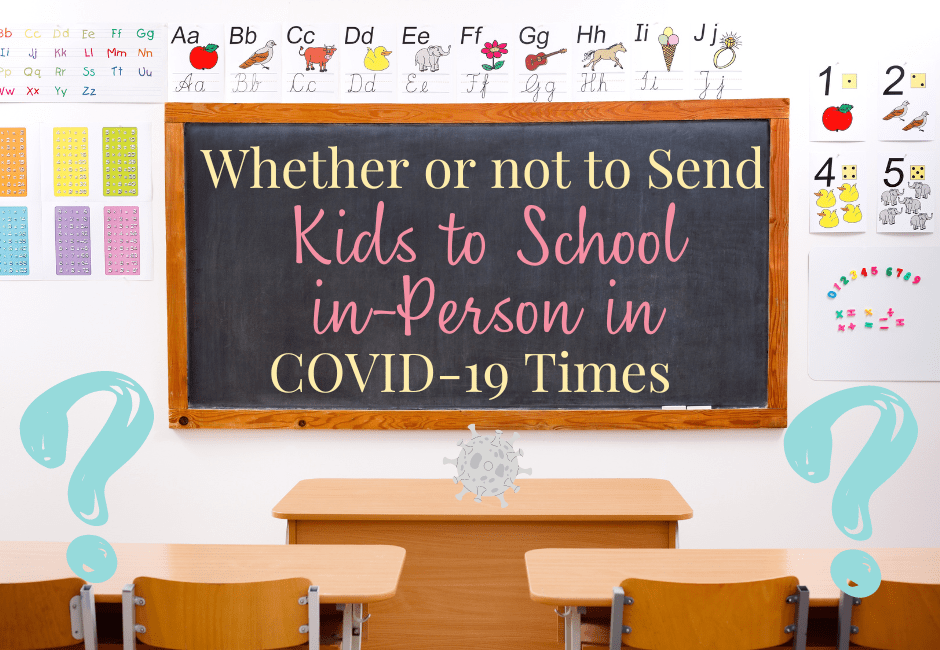
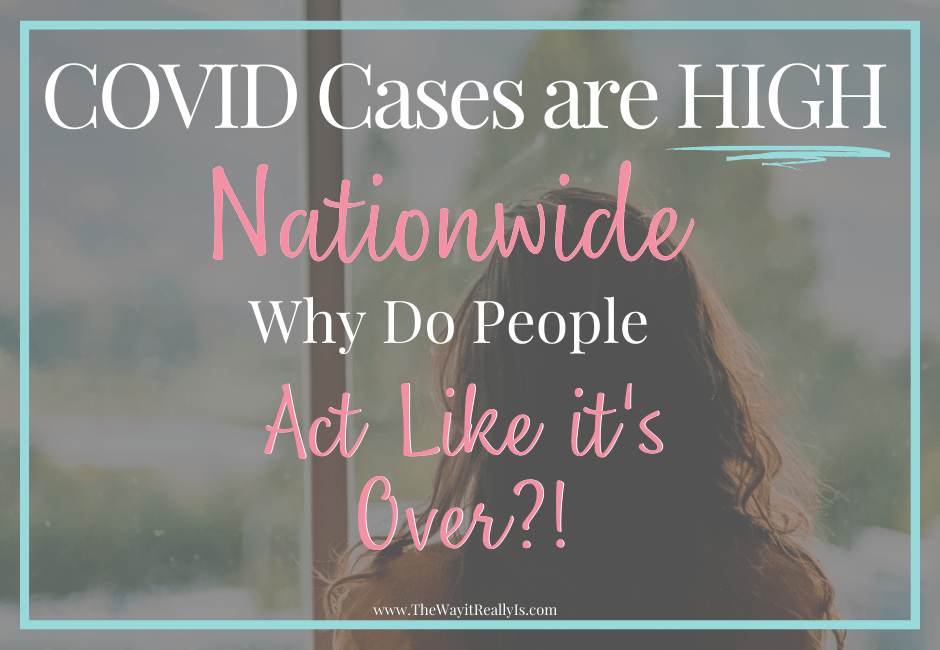

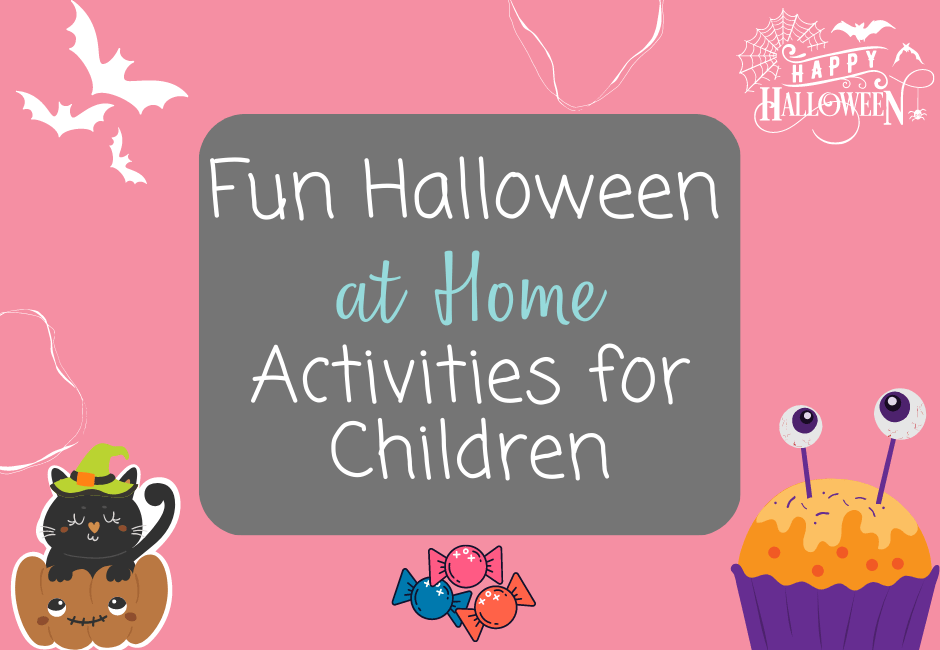
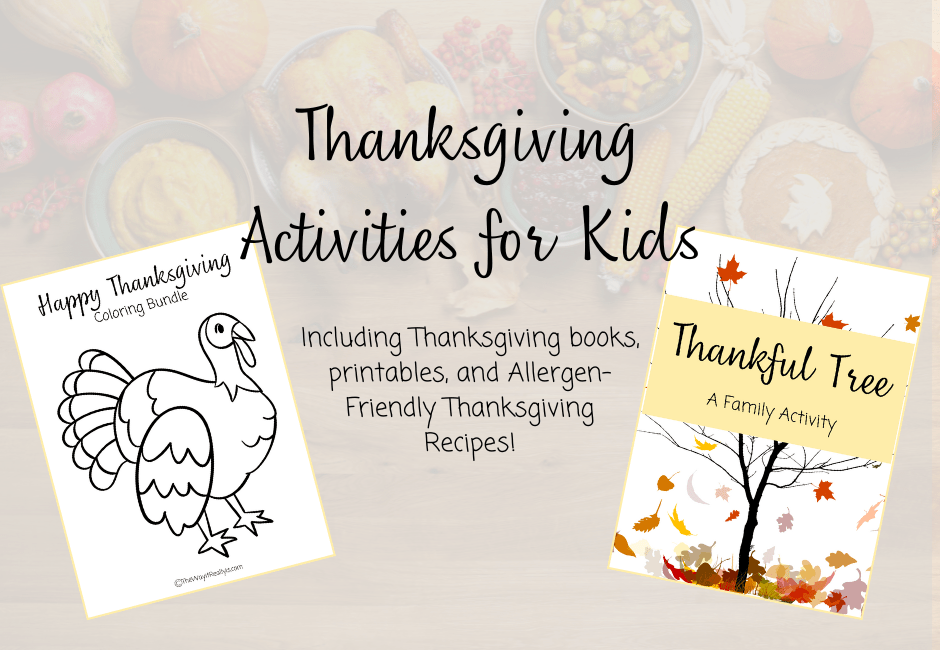

makes me feel less alone to read this. thanks for writing it. we still do it too. our precautions are like exactly the same but we dont have kids. i love you, i care that it is more dangerous for you, and i will never leave you behind.
You’re welcome, Maggie, I’m so glad that reading this has helped you feel less alone. Thank you so much for your kind words and compassion. Continued good health & virtual hugs to you!!
I am still coviding. Isolating and masking. Have Hashimotos, asthma and am overweight (though I excercise and eat paleo). I’ve lost all my friends who think I’m weird for still Coviding. But my siblings still stay close with me (by phone). I’m 60, no parents and no kids. My husband, who works outside the home, masks at home to protect me until he tests out and can unmask. It’s a lonely life being the last hold out. But I don’t want Long Covid and the RESEARCH IS CLEAR, Covid damages those with even mild cases. The general population is in for a lifetime of health issues by repeatedly contracting Covid. As my late father said, “Sometimes early, but never wrong.” We are the vanguard of survivors in this continuing pandemic.
Genevieve, I’m so completely with you, it sounds like we have a lot in common! I’m sorry to hear you’ve lost your friends, I hear ya, it’s so hard. I’m glad you still have your siblings 🙂 I completely agree, the research is clear that even if people don’t die from COVID the long lasting effects are often detrimental, and those of us with Hashimoto’s or other chronic illnesses know how much suffering is involved with a long term illness but the general population just doesn’t get it! Virtual hugs to you my fellow Hashimoto’s warrior and Still COVIDing sister!!
Thank you for writing this. It feels like I wrote it myself. There must be SO many families like this right now. Being isolated for doing the right thing for the health of you and your family is backwards. You all deserve a lot for keeping everything afloat for you and your kids. Those of us who are “Still Coviding” need to stick together like the new family we are, being a lot of us have lost our friends and family now. Thank you for sharing your journey. We’re still out here.. you’re not alone 🙂
I’m glad it resonated with you and thank you for assuring me I’m not alone. It sure feels like it sometimes, doesn’t it? I agree about sticking together 🙂 Virtual hugs to you!
Thank you for writing this, it means so much to me to know we are not alone! How do you handle medical/dental/vision, especially preventative care for kids, like routine physicals, dental visits or vision checks? In most ways we are happy in our bubble too, but always wrestling with these types of choices.
You’re welcome, I’m glad this has helped you feel less alone! Admittedly, we haven’t had our kids in for well checks since June 2021 when cases were moderately low and we had some concerns so brought them in. They’ve all been quite healthy, especially since we stay in our bubble. With the dentist, we haven’t been since COVID hit, though we do have appointments in May at a place about an hour away that still takes precautions. We haven’t felt the need to do vision checks other than when the twins had to do their early childhood screening which turned out just fine. I’m sure many will disagree with how we’ve been handling medical things but our kids are happy, healthy, and I figure we’re at a bigger risk of illness going in for well check appointments when the kids are already well than not. We’ll see how that goes long term vs. the long term health effects of COVID infection on kids who get COVID, especially multiple times. *shrug* It’s hard to know what to do though, that’s for sure.
Hi! I really resonate with you guys. My son and I have a hereditary immune deficiency and I have a clotting disorder (Covid causes micro clotting) and I’m over 70. So we are definitely still Covid-ing. We are in central NJ and are as strict as you all. I’m even avoiding the dentist which really worries me. If you feel like connecting, feel free to reach out! Best of luck to you! Kathy (and my son David)
Hi Kathleen! Glad to hear I’m not alone though sorry to hear you and your son have to be so careful as well. We’ve been avoiding the dentist as well. I finally found a dentist about 45 minutes from us here in MN that takes COVID precautions so made an appointment for all 5 of us in May, hoping that case numbers will be lower again and hoping the dentist will still be as careful then as they are now. I love connecting with more COVID cautious people, I’ll reach out for sure 🙂 Best to you and your son David!